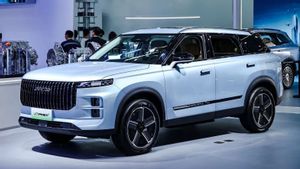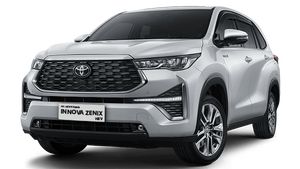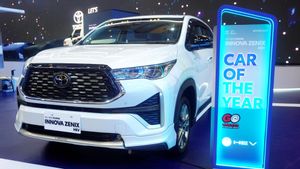JAKARTA - China's dominance of the global electric car industry is on display this week at the Beijing International Automotive Exhibition (China Auto Show).
BYD also showcased two luxury models as part of their strategy to reap premium market share. This year, automakers are expected to launch 110 new electric car and plug-in hybrid models in China, mostly from Chinese brands.
According to a Reuters report, quoted April 29, the fear of a number of US and European politicians who fear their auto industry will be destroyed by the invasion of cheap electric cars from China, especially BYD, is now unproven.
Instead of lowering prices, BYD actually set a much higher selling price for the export market than the price in its home country.
This significant price increase aims to achieve a large profit margin that BYD in China cannot get due to fierce competition. According to a Reuters search on BYD's five largest export markets, the selling price of BYD's electric cars in those countries can reach two, sometimes even three times, compared to the selling price in China for their three main models.
For example, BYD Atto 3, a compact electric crossover, is priced at US$19,283 (Rp313 million) for the mid-range version in China. While in Germany, the small SUV is set at US$42,789 or equivalent to Rp650 million, the price is still competitive compared to similar electric cars in the market. And in Indonesia it is still cheaper, starting from Rp515 million for the basic variant of Advanced.
At a closed-door meeting with investors in March, BYD Chairman Wang Chuangfu said exports are expected to increase the company's profitability this year amid a price war that is taking place on China's domestic market.
SEE ALSO:
BYD Production Fee Advantage
This striking price difference reflects in part China's intense competition, the world's largest car market, where dozens of electric car brands are priced at each other. For example, BYD Seagull's electric hatchback is priced at less than US$10,000 (Rp162 million) in China.
This massive production cost advantage makes China's electric car industry superior to foreign competitors. BYD has reduced production costs at each production stage, from raw materials to batteries, land, and labor, according to experts in China's automotive industry and battery cost data.
In addition, the Chinese government provides large subsidies to domestic and foreign brands selling electric cars in China. For the record, electric and plug-in hybrid vehicles accounted for more than a third of China's total new car sales last year.
For now, Chinese automakers, led by BYD, are satisfied to maintain high export prices and reap profits. This is because Chinese car manufacturers, such as BYD, often have difficulty getting to the break-even point or making little profit in their own domestic market.
"They have absolutely no intention of weakening the European market," said Ben Townsend, head of the automotive division at Thatcham Research, UK.
"They want to make a profit," he added.
In addition, BYD and other electric car manufacturers are also working to eliminate the stigma of cheap Chinese products in line with their efforts to build a global reputation and focus on maintaining a strong resale value.
The English, Chinese, Japanese, Arabic, and French versions are automatically generated by the AI. So there may still be inaccuracies in translating, please always see Indonesian as our main language. (system supported by DigitalSiber.id)















